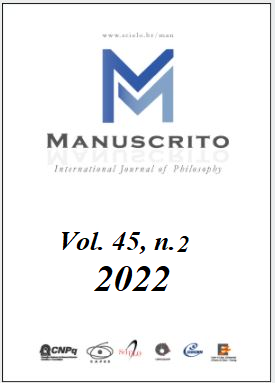Abstract
The paper argues that adopting a form of skepticism, Skeptical-Dogmatism, that recommends disbelieving each philosophical position in many multi-proposition disputes- disputes where there are three or more contrary philosophical views-leads to a higher ratio of true to false beliefs than the ratio of the “average philosopher” (as indicated by survey data). Hence, Skeptical-Dogmatists have more accurate beliefs than the average philosopher. As a corollary, most philosophers would improve the accuracy of their beliefs if they adopted Skeptical-Dogmatism.
References
Aikin, S. (2014). Evidentialism and the Will to Believe. Bloomsbury USA.
Ballantyne, N. (2016). Verbal disagreements and philosophical scepticism. Australasian Journal of Philosophy, 94(4), 752-765.
Baumann, M. (2018). Parfit, Convergence, and Underdetermination. J. Ethics & Soc. Phil., 13, 191.
Bourget, D., & Chalmers, D. J. (2014). What do philosophers believe? Philosophical Studies, 170(3), 465-500.
Chignell, A. (2018). The Ethics of Belief. In Stanford Encyclopedia of Philosophy. Available in: https://plato.stanford.edu/entries/ethics-belief/
Christensen, D. (2007). Epistemology of disagreement: The good news. The Philosophical Review, 187-217.
Clifford, W. K. (2010). The ethics of belief and other essays. Prometheus Books.
Cooper, J. M. (2007). Socrates and Philosophy as a Way of Life. Maieusis: Essays in Ancient Philosophy in Honour of Myles Burnyeat, 20-43.
Cooper, J. M., & Hutchinson, D. S. (1997). Plato complete works. Hackett Publishing.
Dorst, K. (2019). Lockeans maximize expected accuracy. Mind, 128(509), 175-211.
Driver, J. (2014). The History of Utilitarianism. In The Stanford Encyclopedia of Philosophy. Available in: https://plato.stanford.edu/archives/win2014/entrie s/utilitarianism-history
Easwaran, K., & Fitelson, B. (2015). Accuracy, coherence, and evidence. Oxford Studies in Epistemology, 5, 61-96.
Elga, A. (2007). Reflection and disagreement. Noûs, 41(3), 478-502.
Enoch, D. (2010). Not just a truthometer: Taking oneself seriously (but not too seriously) in cases of peer disagreement. Mind, 953-997.
Feldman, R. (2003). Epistemology. Pearson College Division.
Friedman, J. (2013). Suspended judgment. Philosophical Studies, 162(2), 165-181.
Fumerton, R. (2010). You Can’t Trust a Philosopher. In Disagreement. Oxford University Press.
Goldberg, S. C. (2009). Reliabilism in philosophy. Philosophical Studies, 142(1), 105-117.
Goldman, A., & Blanchard, T. (2019). Social Epistemology. In Stanford Encyclopedia of Philosophy. Available in: https://plato.stanford.edu/entries/epistemology-social/
Hankinson, R. J. (1999). The Sceptics. Routledge.
Hazlett, A. (2013). A luxury of the understanding: On the value of true belief. Oxford University Press.
Hegel, G. W. F. (1991). Hegel: Elements of the philosophy of right. Cambridge University Press.
James, W. (2014). The will to believe. Routledge.
John, D. (1934). Art as experience. New York: Minton, Balch, and Company.
Lewis, D. K. (1983). Philosophical Papers: Volume I. Oxford University Press.
Machuca, D. E. (2011). Ancient Skepticism: Pyrrhonism. Philosophy Compass, 6(4), 246-258.
Masny, M. (2018). Friedman on suspended judgment. Synthese, 1-18.
McCormick, M. S. (2014). Believing against the evidence: Agency and the ethics of belief. Routledge.
Mittag, D. M. (2015). Evidentialism. In Internet Encyclopedia of Philosophy. Available in: https://iep.utm.edu/evidenti/
Parfit, D. (1987). Reasons and Persons. Oxford University Press.
Pettigrew, R. (2016a). Accuracy and the Laws of Credence. Oxford University Press.
Pettigrew, R. (2016b). Jamesian epistemology formalised: An explication of ‘The will to believe.’ Episteme, 13(3), 253-268.
Rawls, J. (1971). A Theory of Justice. Harvard University Press.
Ribeiro, B. (2011). Philosophy and disagreement. Crítica: Revista Hispanoamericana de Filosofía, 3-25.
Sextus Empiricus. (1996). Outlines of Pyrrhonism. In The Skeptic Way (translated by Benson Mates). Oxford University Press.
Sosa, E. (2010). The Epistemology of Disagreement. In Social Epistemology (pp. 278-297). Oxford University Press.
Steinberger, F. (2019). Accuracy and epistemic conservatism. Analysis, 79(4), 658-669.
Thorsrud, H. (2009). Ancient Scepticism. University of California Press.
Thune, M. (2010). ‘Partial defeaters’ and the epistemology of disagreement. The Philosophical Quarterly, 60(239), 355-372.
Vogt, K. (2010). Ancient skepticism. In Stanford Encyclopedia of Philosophy. Available in: http://stanford.library.usyd.edu.au/entries/skepticism-ancient/

This work is licensed under a Creative Commons Attribution 4.0 International License.
Copyright (c) 2022 Manuscrito: Revista Internacional de Filosofia


